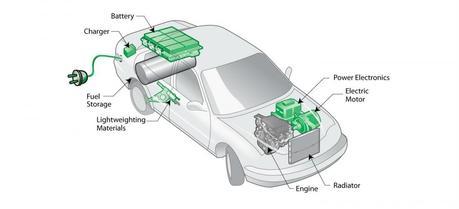 As part of a U.S. Department of Energy’s push to improve electric and plug-in hybrid electric vehicles, Argonne received $4.7 million in funding for three research projects exploring better battery and lubrication technologies. (Credit: Argonne National Laboratory)
As part of a U.S. Department of Energy’s push to improve electric and plug-in hybrid electric vehicles, Argonne received $4.7 million in funding for three research projects exploring better battery and lubrication technologies. (Credit: Argonne National Laboratory)Argonne National Laboratory (ANL) has received $4.7 million from the U.S. Department Of Energy (DOE) for three projects to develop new electric vehicle technologies, including capacitors, electrochemical couples and electrolytes for batteries intended for hybrid and electric vehicles.
The selections are part of a $45 million portfolio of 38 projects intended to advance vehicle technologies which will further improve fuel efficiency, lower transportation costs, and protect the environment.
A team led by Argonne Distinguished Fellow Khalil Amine will receive $2.5 million to develop next-generation batteries for electric and plug-in hybrid vehicles. Amine, whose earlier battery work already made its way into the Chevy Volt, will further improve on lithium-ion batteries, the type currently used in cars, laptops and cell phones. The new system combines a high-energy cathode with a high-energy anode and a new, advanced electrolyte that would offer a significant increase in energy density over current batteries.
“This project is different from what my research group and Argonne’s battery research program has done in the past because we’re looking at developing a complete battery package,” Amine said. “I’m very excited about the opportunity to advance this project.”
Argonne senior scientist Balu Balachandran will lead a team that received $1.8 million for new capacitors intended for advanced power inverters in electric-drive vehicles.
“Batteries operate on DC, or direct current, whereas electric motors in cars operate on AC, alternating current,” Balachandran said. “Similarly, when the battery is drained, you plug it in to charge and the outlet on your wall is AC, so you have to convert that as well.” Thus an important part of an engine for these cars is a power inverter, which converts the current. The team will work on a integral part of a power inverter called a capacitor to make it more able to withstand high temperatures and current.
Argonne chemist Zhengcheng (John) Zhang will receive $360,000 to study a new type of electrolyte for lithium-ion batteries in electric vehicles. The electrolyte is the medium that allows ions to flow from one pole of the battery to the other as it charges and discharges. Researchers are intrigued by a new material called high-voltage spinel, which could significantly improve the energy density of a battery, reducing its size and cost.
“The problem is that no current electrolyte can withstand that high a voltage at the high temperatures in a battery,” Zhang said. The project aims to design a new type of electrolyte that is stable enough to withstand these conditions.
“Argonne is a world leader in advanced battery and vehicle technology research,” said Argonne director Eric Isaacs. “These new projects will speed the work of our scientists and engineers as they develop the innovative technologies needed to build higher-efficiency, lower-cost vehicles for American consumers.”
Argonne researchers will also play a role in three other projects funded by the awards. The full list of awards is available on the DOE website.

